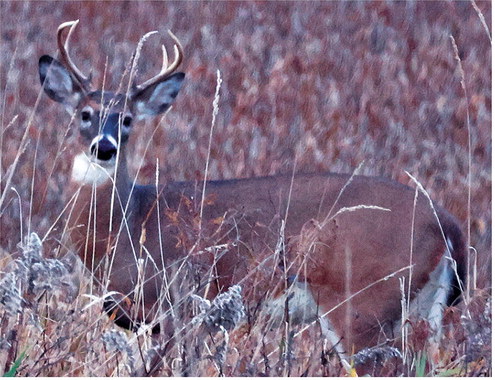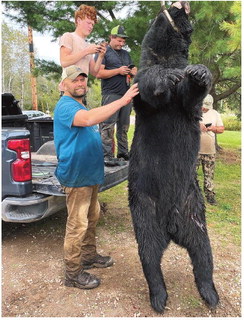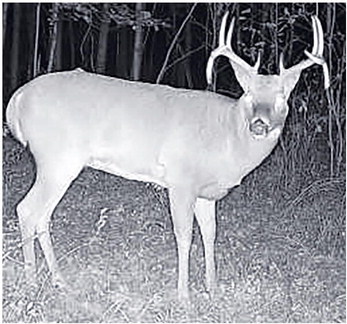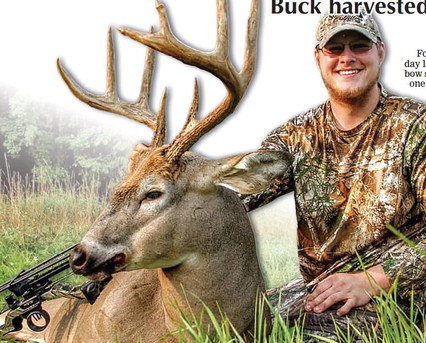Being flexible with ammunition can help hunters work around shortages
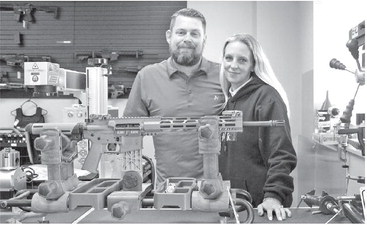

MacMillan Arms co-owners Dr. Chad MacMillan and Kristina Mauk sell tactical rifles, including AR-15s and AK-47s, out of their by-appointment retail shop in the Marathon City Business Park. They also sell a wide variety of ammunition, including shells from Israel, Russia and Egypt. Photo by Peter Weinschenk
By Peter Weinschenk, The Record-Review
So, you want to go hunting? That means, first, you’ll need a gun. Second, you will need ammunition.
Assuming you can pass a background check, obtaining a firearm is relatively easy. Getting ammo, however, can be harder. Shipments of ammunition boxes fly off the shelves of big box retail stores. Shortages abound.
Dr. Chad MacMillan, Edgar, co-owner of MacMillans Arms, Marathon City, recommends hunters wean themselves off of specialty ammo, especially if they are adverse to paying premium prices for bullets.
MacMillan, who specializes in selling tactical rifles, including AR-15s and AK-47s, said ammunition shortages are real, caused mostly by hoarding but also government policy, including a recent embargo of cheap Russian ammunition.
He said many hunters have “unrealistic expectations” when they think they can order specialty ammunition, such as Corelock silvertip bullets, without paying high prices.
MacMillan said many hunters want to use the ammo that their father or grandfather enjoyed but not wind up paying $85 for a box of 20 bullets.
The way around this dilemma, he said, is to learn to “zero in” rifles using standard ammunition. “It shoots fine,” he said.
MacMillan said there is a huge international industry that makes ammunition and that factories around the world are at “maximum capacity” making bullets. The world should be awash in ammunition, he said, but, since there is little profit in ammo, manufacturers have tried to upsell their product with specialty improvements. These niche bullets are prone to shortages, McMillan said.
The solution, he said, is for hunters to unlearn habits where they only shoot with specialty bullets.
“Hunters buy this ammunition because they are looking for that edge,” MacMillan said. “They tell me they only shoot Winchester or Remington. That has created a lot of bad shooting habits. The problem is that people are unwilling to change.”
McMillan said he will search the globe to get the ammunition people want without any quantity restrictions, but gets frustrated when hunters both get picky about their brand and type of ammunition while, at the same time, expect to pay dirt-cheap prices.
“The casual hunter is not willing to pay the higher price or change the ammo,” he said. “Hunters need to be more flexible.”
MacMillan said Wisconsin hunters don’t need special ammunition to bag a deer. Regular ammunition will work.
“Just sight in your rifle using generic ammunition,” he advised. “You’ll get your deer. I mean people have been shooting deer with regular ammunition for hundreds of years. They were successful shooting with a musket. If a musket works, standard ammo is going to work.”
MacMillan clarified that he is not against use of specialty ammunition. “It’s just not available,” he said.
MacMillan is all about leading edge firearms. His shop has a 3-D printer where he can print stainless steel and make his own firearms with parts he makes himself. He tries different powders in ammunition in order to adjust bullet speeds (he likes 2,860 feet per second).
The gun merchant said that hunters would be better off not investing in shooting hardware, but, instead, themselves. They need to be better shooters.
“The biggest improvement of firearms is the shooter,” he said “It’s all about safety. You can take firearms from the 1960s and do great. Put an advanced gun in the hands of a new shooter. You’ll have an accident. What most hunters need is range time rather than different ammo.”
MacMillan said hunters all over the world use standard ammunition to shoot animals. They have to, he said. They have no other option.
The store owner said American hunters face an ammunition shortage because there are so many varieties that are sold.
“It’s a problem you only have in a country of abundance,” he said.
“The bolt hits the camera, so I cannot put the camera on the gun until after it’s loaded,” Aaron explained. “So, I load the gun, put the camera on and get the camera secured and everything’s ready to go.”
Ashlynn’s father was busy setting up the camera and using a balled up glove to adjust a Lead Sled shooting rest as the buck moved into position.
“I didn’t even have time to sit down,” he said. “I was still kneeling down beside her, saying ‘OK, now we’ve got to be patient.’” Aaron told his daughter to pull the trigger, and the buck took a broadside hit before running and stopping behind a tree. Before she could take her second shot, though, her dad had to remove the camera, reload the gun, put the camera back on and get her back into position.
The second shot took the deer to the ground. It was an emotional moment for both Ashlynn and her father.
Thinking back, Ashlynn claims she wasn’t nervous at all. Her father disputes this.
“You can talk smart, but you were a little bit nervous,” he says to her.
Even though the hunting was done in less than half an hour, the family stayed the rest of the weekend to fully soak in the experience. Ashlynn’s mother, Sommer, and her grandfather, Randy King, were both there to help her celebrate her accomplishment, and they were also joined by another family of close friends. On that Saturday night, they enjoyed a steak dinner -- as requested by Ashlynn.
By coincidence, Ashlynn turned 15 on the Monday after she nabbed her 15-point buck.
When she returned to school, she sent a picture of her buck to the principal of Edgar High School, who forwarded it to members of the staff. She said all of the hunters at the school, including one classmate, were a little jealous of the buck and asked her a lot of questions about her experience.
Looking ahead, Aaron hopes to keep his daughter interested in deer hunting by getting her involved in an outing next October for disabled hunters organized by the Central Wisconsin Conservation Club in Edgar. He normally volunteers, and the leader of the group has been trying to get him to bring Ashlynn out for a hunt.
Aaron said Ashlynn’s experience at Little Lakes Memories is just the starting point.
“It was her first hunt, but it won’t be her last,” he said.
